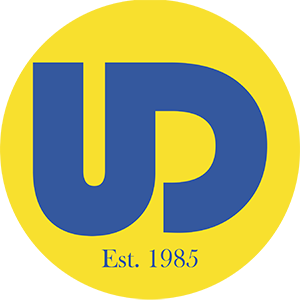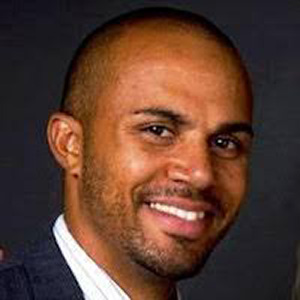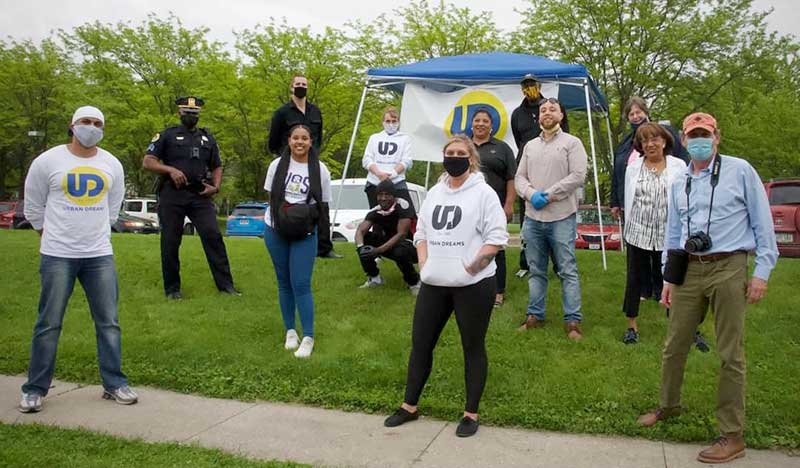Amplify.
A dedicated Iowa organizer expands his agency, Urban Dreams, just when his community needs him most.
Izaah Knox had an enormous amount to tend to well before the Black Lives Matter protests erupted in Iowa and across the nation.
As executive director of Urban Dreams in Des Moines, he leads a nonprofit that offers outpatient substance-abuse and mental-health treatment, prison diversion seminars for first-time intoxicated drivers, employment and afterschool IT programs, food distribution, and nonpartisan voter education.
He is both a minority small-business owner and a community organizer dedicated to giving disadvantaged people of color from all walks of life multiple opportunities to improve and thrive.
“The most dangerous thing you can tell people is that they can do anything without showing them how to do it,” has long been his mantra.


The value of assets held by Urban Dreams at the start of 2019, up from $13,549 at the start of 2018.
A catalyzing moment.
Then George Floyd was killed and Izaah’s phone started buzzing all the more. Everyone wanted ideas on how to use the BLM momentum to launch systemic police reforms. One of the callers was Gov. Kim Reynolds, who asked Izaah to join her Committee on Criminal Justice Reform.
The timing was ideal for two reasons:
First, Urban Dreams – founded in 1985 and led by Izaah since 2017 – had already made inroads with the Des Moines police by co-developing a boxing club and summer hoops league, and by sponsoring 24-hour buffets where community members and first responders — and police in particular — share “positive out-of-car experiences.” He had the standing to bring ideas for forceful change to the governor’s table.
And second, a year earlier, Izaah became one of the first small-business owners in Iowa to join the Goldman Sachs 10,000 Small Businesses (10KSB) Program. He was already finding ways to cut spending, raise revenues and adopt new programming. Through 10KSB, Urban Dreams could supercharge those efforts.
“I come from a long line of entrepreneurs and we know how to make money,” Izaah said, “but we weren’t in a position to use all the tools out there. With Goldman and ICIC, we have more marketing, better access to financing, and we can grow at the right speed.”

“Izaah Knox is the epitome of a ‘walk the walk’ leader – involved in all manners of activities that educate, empower and raise up individuals in our community.”
— U.S. Representative Cindy Axne, in naming Izaah
Iowan of the Week for June 13, 2020.
Priming for the future.
The Iowa police reforms Izaah successfully pressed for include steps Urban Dreams can help with directly:
- Ending “racially discriminatory or pretextual traffic stops,” a problem long documented despite being outlawed in 2003;
- Banning chokeholds unless officers believe their lives are at risk;
- Granting the Iowa Attorney General’s Office the power to prosecute officers who commit a criminal offense leading to death;
- Requiring police agencies to provide annual de-escalation and implicit bias training;
- Revoking law enforcement licenses for officers guilty of “serious misconduct.”
Izaah is already looking ahead. He spent April and May ensuring he could pay his eight full-time staffers through the Paycheck Protection Program and training them in Zoom and Google Hangouts to make “everyone self-sufficient as fast as possible.”
Now, with 350 people suddenly arriving daily for food, compared to 100 people pre-Covid, he has sought donations of masks and hand sanitizer, and studied food-safety packaging. When clients come, he says, “We take the chance to educate them on masks and sanitizer.”
The 10KSB program, meanwhile, is helping Izaah navigate the purchase of a new location in Cedar Rapids. He says the recovery will be longer and harder for people of color, and added: “We certainly don’t want to bail on our neediest people when they need us most.”


The weight of food donations sometimes received daily by Urban Dreams, allowing it to distribute groceries to as many as 350 people six days a week.